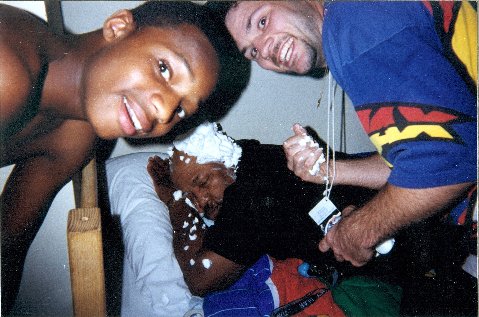The photo shows a teenage “Bad” Chad Dawson leaning in from the left border while his co-conspirator, “Iceman” John Scully, leans in from the right. Their mischievous grins frame their handiwork — a sleeping victim of a shaving cream attack.
It was taken about three years before Dawson first fought professionally.
In an interview with TQBR on Thursday, Scully describes who Dawson was and who Dawson has become in preparation for his Saturday bout against super middleweight champion Andre Ward.
On 24/7, Chad talked about finding a renewed love for boxing. How have you witnessed his realization?
ICE: It’s actually something we talked about at the beginning of this camp. I remember reminding him of why he loved this sport to begin with. I remember telling him that it would be great if all athletes could love and be excited about their sport the way they were when they were 12 years old. That enthusiasm, that eagerness we exhibited back then, is something that many athletes lose somewhere along the line. They start talking about money and the bad parts of their business and the day when they will be able to retire. They lose something in the way of love for the game, that pure love you had when you were 12 years old pretending you were Muhammad Ali or Roy Jones, Jr. while boxing some kid in the Golden Gloves. Everyone should hold on to that, and I think he has that back. He wants to enjoy what he has and the position that he’s in, and he also wants to strongly enhance his position. To do that he needs to maintain that youthful enthusiasm.
You and Chad have grown together in your current professions after years of working with each other. How different is your interaction now than it was the first few years? What is a common exchange between the two of you?
ICE: For the most part I would say it is pretty much the same as it always was. I didn’t train him when he was a kid or when he first turned pro, but I was around him quite a bit back then either on amateur trips or later on when we frequently sparred with each other. Back then he was younger, and it was more of a thing where our interaction was really laid back and a lot of fun. My amateur team and the team he was on used to go at it on trips with pranks and water gun fights and things like that. A lot of fun stuff, but now he is a million-dollar athlete so we can’t be up in the dorm at 3 a.m. shaving creaming sleeping people like we did at Lake Placid back in 1998.
How long did the HBO cameras follow you? How was it with the camera crew there as often as it was?
ICE: They actually weren’t here for very long overall, maybe four days. They were on us everywhere we went, though, but it really got to be a thing where you forget they are there. A lot of the stuff they filmed on 24/7 I actually don’t really recall them being there for.
What preparations have been taken specifically for the Andre Ward bout? Head clashes are more abundant in his fights than many of his peers’ bouts.
ICE: Yes, we definitely have to be aware and prepare for the potential for head butts the same way we did when we prepared for (Bernard) Hopkins. It’s just a matter of staying alert, staying in the proper position to avoid these things.
How active were you in the process of Chad cutting seven pounds that he hasn’t been used to shaving?
ICE: I actually had very little input into the process. Nothing more than some encouraging words here and there. His strength coach and nutritionist handled everything in regards to that aspect of the camp and I would just get updates and confer with him on it all every few days to see what he thought about the progress. My job is only to get Chad’s mind and his strategy and his boxing game on point, and that’s a big enough job all in itself. So we all have our individual jobs to do here.
Where does this match rank in Chad’s career?
ICE: The first (Antonio) Tarver fight and both Hopkins fights were huge for him but all things considered I would say this one ranks as the most important. I suppose at this point every fight going forward is going to be equally as important as the previous, but for this one there are implications involved as more than just a win and a loss. You are talking about becoming a two-division champion and possibly cementing a spot in the International Boxing Hall of Fame down the line with a victory, so the importance is off the charts, really.

